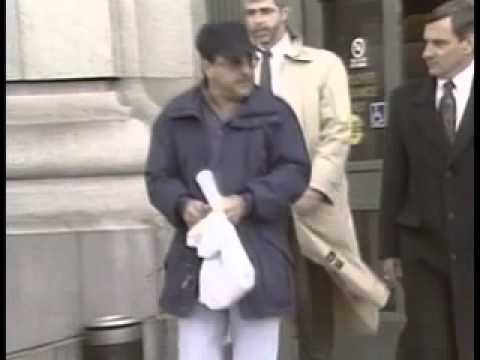Introduction: Examining the Mafia Presence in Rhode Island
The presence of the mafia has long been a subject of fascination and concern in Rhode Island. This article aims to shed light on the extent of organized crime in the state, examining its historical context, analyzing statistics, and exploring the impact of the mafia on various aspects of Rhode Island society. While pop culture and media often romanticize the mafia, it is crucial to understand the true nature of this criminal organization and its implications for the state.
Historical Context: The Roots of Organized Crime in Rhode Island
Rhode Island has a deep-rooted history of organized crime, dating back to the early 20th century. The mafia, also known as La Cosa Nostra, established a significant presence in the state during Prohibition, taking advantage of the lucrative bootlegging trade. The arrival of Italian immigrants in large numbers during this period provided fertile ground for the growth of organized crime syndicates.
Analyzing Statistics: Evaluating Mafia Membership in the State
Determining the exact number of mafia members in Rhode Island is a challenging task due to the secretive nature of these criminal organizations. Despite this, law enforcement agencies estimate that there is a notable presence of mafia members in the state. While the numbers may not be as substantial as in other infamous mafia strongholds, such as New York or Chicago, Rhode Island has had its fair share of influential and notorious mobsters.
Infamous Figures: Notorious Mafia Members of Rhode Island
Rhode Island has seen its share of infamous figures involved in organized crime. Among the most notorious was Raymond Patriarca, Sr., who led the New England mafia for several decades. Nicknamed "The Man," Patriarca exerted significant influence over criminal activities in the state, ranging from gambling and loan-sharking to drug trafficking and racketeering. Other notable mafia figures in Rhode Island include Luigi "Baby Shacks" Manocchio and Frank "Bobo" Marrapese.
Influence on Politics: The Mafia’s Role in Rhode Island Politics
The mafia’s influence in Rhode Island was not limited to criminal activities alone. Over the years, there have been instances of organized crime infiltrating the political landscape. The mafia often sought to gain control over key political figures and institutions to protect their criminal enterprises and further their interests. Reports of corruption, bribery, and manipulation of elections involving mafia members have raised concerns about the integrity of Rhode Island’s political system.
Criminal Activity: Exploring Mafia Operations in the State
Mafia operations in Rhode Island have been diverse and far-reaching. Extortion, illegal gambling, loan-sharking, and drug trafficking are among the main criminal activities associated with the mafia in the state. The mafia has built a network of illicit businesses and connections that span both legitimate and illegal industries, allowing them to maintain control and generate substantial profits.
Law Enforcement Efforts: Battling the Mafia in Rhode Island
Law enforcement agencies in Rhode Island have consistently worked to combat organized crime and dismantle mafia activities. The Rhode Island State Police, in collaboration with federal agencies like the FBI, have conducted extensive investigations into mafia operations. These efforts have led to the prosecution and incarceration of numerous mafia figures, significantly disrupting their criminal enterprises.
Economic Impact: The Mafia’s Influence on Rhode Island’s Economy
The presence of the mafia in Rhode Island has had a significant impact on the state’s economy. The illicit activities of organized crime syndicates have not only generated substantial profits for the mafia but have also resulted in economic losses for legitimate businesses. Extortion schemes, control over labor unions, and illegal gambling operations have all contributed to an underground economy that undermines the growth and stability of Rhode Island’s legitimate industries.
Social Effects: How the Mafia Impacts Rhode Island Society
The influence of the mafia extends beyond the realm of economics and politics. Organized crime has a corrosive effect on Rhode Island society, fostering an environment of fear, coercion, and violence. Communities that fall under the sway of the mafia often suffer from increased criminal activity, reduced trust in law enforcement, and a general decline in the overall quality of life.
Prosecution: Legal Actions against the Mafia in Rhode Island
Rhode Island’s legal system has been committed to prosecuting members of the mafia and dismantling their criminal enterprises. Over the years, legislation such as the Racketeer Influenced and Corrupt Organizations Act (RICO) has been instrumental in bringing down mafia figures. Prosecutions have relied heavily on wiretaps, undercover operations, and witness testimonies to build strong cases against organized crime syndicates.
Current Status: Assessing the Present Mafia Presence in Rhode Island
While the exact number of mafia members in Rhode Island remains elusive, law enforcement agencies continue to monitor and combat organized crime in the state. The decline of traditional mafia operations and the rise of other organized crime groups have reshaped the criminal landscape. However, the threat of the mafia in Rhode Island persists, albeit in a more covert and elusive form.
Combating the Mafia: Strategies for Reducing Organized Crime
To effectively combat the mafia, Rhode Island must continue to invest in law enforcement efforts, intelligence gathering, and community outreach initiatives. Strengthening partnerships between local, state, and federal agencies is crucial for sharing resources and information. Additionally, educating the public about the dangers and consequences of organized crime can help create a united front against the mafia’s influence, fostering a safer and more resilient Rhode Island.





